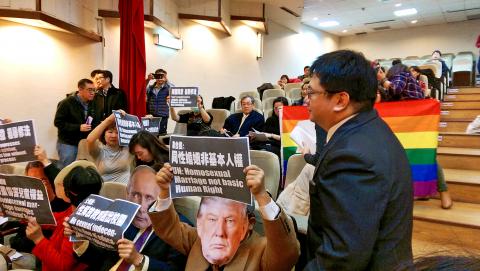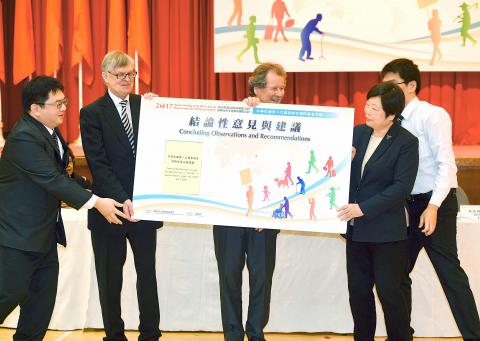International human rights experts yesterday presented a report recommending the abolition of capital punishment, work to relieve prison overcrowding, liberalizing policy over drug users and decriminalizing adultery.
The report listed 78 observations or recommendations for government consideration, following four days of meetings in Taipei this week regarding the International Covenant on Civil and Political Rights (ICCPR) and the International Covenant on Economic, Social and Cultural Rights (ICESCR).
The review was the second of its kind since the covenants were adopted by Taiwan in 2009.

Photo: Hsiang Cheng-chen, Taipei Times
The ICCPR panel was chaired by Manfred Nowak of Austria, former UN special rapporteur on torture, while the ICESCR panel was chaired by Eibe Riedel of Germany, former vice chairman of the UN Committee on Economic, Social and Cultural Rights.
Nowak urged President Tsai Ing-wen (蔡英文) to take decisive steps by introducing a moratorium on executions, with the aim of full abolition of the death penalty in the near future.
“The committee is also concerned about overcrowding of detainees in the prison system, which leads to a variety of human rights problems, such as poor hygiene, a lack of privacy and increased violence,” Nowak said in presenting the report at the Ministry of Justice building yesterday.

Photo: Peter Lo, Taipei Times
“We recommend the government constructs new prison facilities and reduces the number of detainees by liberalizing some of the harsh policies regarding drug users,” he said.
The committee recommended legislative changes to reduce the length of criminal proceedings and to provide adequate reparation in cases of excessive detention, Nowak said.
The government should also take steps to decriminalize adultery, as it has a disproportionately negative affect on women and is a violation of the right to privacy, Nowak said.
Nowak said that “Taiwan can show it could be a pioneer in the Asia-Pacific region to combat discrimination on the basis of sexual orientation and gender identity.”
The ICESCR report said that while the government had taken steps to recognize the status of Pingpu as Aborigines, it is concerned that the classification of Aborigines into three categories — “mountain people,” “plains people” and “Pingpu” — is a legacy of the Japanese colonial period and does not correspond with the present situation of 16 official Aboriginal groups.
“The committee recommends that the government apply the classification of indigenous peoples as identified by themselves, and guarantees them full and equal participation and representation,” it said, adding that the government should “develop effective mechanisms to seek free, prior and informed consent of indigenous peoples on development programs that affect them.”
Miloon Kothari of India, a former UN special rapporteur on housing, said that government policies must move away from an emphasis on economic development and favoring businesses to the detriment of marginalized groups, poor people and Aborigines, as they have led to land expropriation.
Minister Without Portfolio Lin Mei-chu (林美珠), who co-chaired yesterday’s event, said that capital punishment remains in force because most Taiwanese support it and there has been no decline in the number of executions in recent years.
Groups opposing and affirming same-sex marriage staged protests at the event.

CALL FOR SUPPORT: President William Lai called on lawmakers across party lines to ensure the livelihood of Taiwanese and that national security is protected President William Lai (賴清德) yesterday called for bipartisan support for Taiwan’s investment in self-defense capabilities at the christening and launch of two coast guard vessels at CSBC Corp, Taiwan’s (台灣國際造船) shipyard in Kaohsiung. The Taipei (台北) is the fourth and final ship of the Chiayi-class offshore patrol vessels, and the Siraya (西拉雅) is the Coast Guard Administration’s (CGA) first-ever ocean patrol vessel, the government said. The Taipei is the fourth and final ship of the Chiayi-class offshore patrol vessels with a displacement of about 4,000 tonnes, Lai said. This ship class was ordered as a result of former president Tsai Ing-wen’s (蔡英文) 2018

‘SECRETS’: While saying China would not attack during his presidency, Donald Trump declined to say how Washington would respond if Beijing were to take military action US President Donald Trump said that China would not take military action against Taiwan while he is president, as the Chinese leaders “know the consequences.” Trump made the statement during an interview on CBS’ 60 Minutes program that aired on Sunday, a few days after his meeting with Chinese President Xi Jinping (習近平) in South Korea. “He [Xi] has openly said, and his people have openly said at meetings, ‘we would never do anything while President Trump is president,’ because they know the consequences,” Trump said in the interview. However, he repeatedly declined to say exactly how Washington would respond in

WARFARE: All sectors of society should recognize, unite, and collectively resist and condemn Beijing’s cross-border suppression, MAC Minister Chiu Chui-cheng said The number of Taiwanese detained because of legal affairs by Chinese authorities has tripled this year, as Beijing intensified its intimidation and division of Taiwanese by combining lawfare and cognitive warfare, the Mainland Affairs Council (MAC) said yesterday. MAC Minister Chiu Chui-cheng (邱垂正) made the statement in response to questions by Democratic Progressive Party (DPP) Legislator Puma Shen (沈柏洋) about the government’s response to counter Chinese public opinion warfare, lawfare and psychological warfare. Shen said he is also being investigated by China for promoting “Taiwanese independence.” He was referring to a report published on Tuesday last week by China’s state-run Xinhua news agency,

‘ADDITIONAL CONDITION’: Taiwan will work with like-minded countries to protect its right to participate in next year’s meeting, the foreign ministry said The US will “continue to press China for security arrangements and protocols that safeguard all participants when attending APEC meetings in China,” a US Department of State spokesperson said yesterday, after Beijing suggested that members must adhere to its “one China principle” to participate. “The United States insists on the full and equal participation of all APEC member economies — including Taiwan — consistent with APEC’s guidelines, rules and established practice, as affirmed by China in its offer to host in 2026,” the unnamed spokesperson said in response to media queries about China putting a “one China” principle condition on Taiwan’s